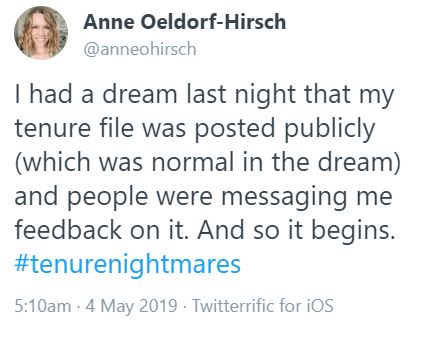Original post:
Every year, I get numerous requests for funded proposals (particularly my CAREER award). I am always happy to share this information, as are most people I know, except of course the budget data, which impacts more people than just me. I’ve been giving this more and more thought lately, and I realized something important. It is a type of privilege to get access to my proposals. I generally only hear from my colleagues at peer institutions or the former student of a friend. I have never been asked by an under-represented minority faculty member whom I do not know. I have been asked by many more white and Asian males than any other demographic (white females are the next biggest group). All these experiences beg the question, who gets access? Who even feels comfortable requesting access? How can we reconsider access to proposals as a matter of equity?
And so I have made a decision. All funded proposals (with my Co-PIs’ agreement and sponsor policy okay) will be posted online for anyone to download. One might ask, but what about other people “scooping” you? To them, I say this: Ideas are easy to come by, even really good ones. What is hard is typically the execution, the analysis, and so on. Additionally, by the time a proposal gets funded, I’ve usually been working on it for years, and at least several months have passed since it was submitted to the funding agency. Finally, I generally don’t believe people who are looking at my funded proposals have any interest in scooping me at all. They are looking for models to match their own good ideas to in terms of argumentation, format, and structure.
I have made another decision as well. I will periodically use FOIA requests on other people’s proposals, if for no other reason that to destigmatize this act for others. So, if you get a FOIA request from me, I hope you will read this and understand (if not agree with) my rationale. And if you get a FOIA request from someone else, I hope you will also give that person the benefit of the doubt. Science is meant to be an open endeavor after all.
If you don’t know a person and don’t feel comfortable requesting their proposal directly, I encourage you to use your federally legislated legal right to do so through the mechanisms available to you, such as these are available through the NSF and NIH FOIA offices. Also, please be respectful of your colleagues’ work if you do use FOIA so that I don’t regret this stance.
Proposals of mine you can read if it helps you:
- NSF Early Career Award: Mobile and Ubiquitous Computing Technologies for Young Children with Chronic Health Conditions
- EAGER: Death and the Social Network, the Persistence of Digital Identity
- CSCW Doctoral Consortium Workshop Funding
- RET Supplement to CAREER
- Microsoft SEIF Award on Accessible NUI
- Robert Wood Johnson Foundation Project HealthDesign – Tracking Preterm Infants
- Google Research Proposal – Glass
- OISE WORKSHOP: US-Mexico Workshop on Interactive and Ubiquitous Computing uniting the Californias (WIUC2)
- Jacobs Foundation Advanced Research Fellowship
I would love to hear from you if you agree, don’t agree, have used my proposals and had them help, or anything else you think might be interesting.
Good luck!
Update as of Feb 2016:
I am happy to say that I have gotten a lot of positive feedback about this decision, including from people who are also now sharing funded proposals publicly. I can also report that this has GREATLY cut down on the number of email requests for this information I get, which as you can imagine is a huge timesaver.
2019 Update:
Due to ….. Anne Oeldorf-Hirsch having a nightmare about her tenure packet being made public, I had a thought. Lots and lots of people shared their tenure binders with me prior to me going up. I also happen to be at a university that demystifies the whole process by having assistant professors vote too. Most people do not have this privelege. So, much like my decision to publish successful grants (see above). I have decided to put my tenure materials on line. Feel free to use them to lull yourself to sleep or maybe they will be helpful for someone.

Here are my tenure files. A couple of things to note: (1) The UC has a file called an AP-10. This is a mandated file that is basically a CV in a different format that specifically documents the review period. That is in there, but it is probably only useful to other UC people and will become less and less useful over time as the format of the actual form changes. (2) I included a summary to the three papers that I submitted alongside my packet. I did not include the actual papers. If you want them and can’t find them online via some other source, let me know. It just seemed to make the packet unwieldy for download/printing/etc. (3) I made a lot of graphs as part of this process. That was partly inspired by Don Patterson doing something similar, but if I am honest, it was mostly a form of procrastination and self-soothing. I am pretty sure it made no difference.
